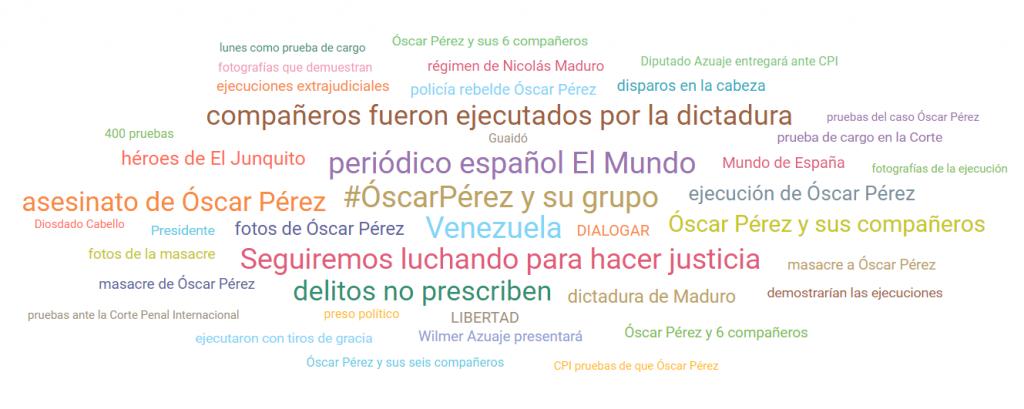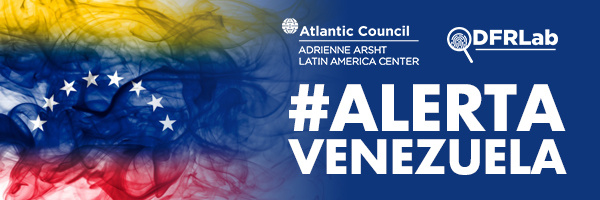#AlertaVenezuela is leading the way in identifying, exposing, and explaining disinformation within the context of one of the Western Hemisphere’s largest crises in recent history, where the fight for control of the information space will continue to pose a challenge for the region.
TOP STORY: Debate about the death of Óscar Pérez reaches social media
On December 8, 2019, Spanish newspaper El Mundo published a set of images that the opposition to the Maduro regime took to the International Court of Justice in The Hague. The action was intended to prove that Óscar Pérez, a former police officer, had been executed by the regime. Venezuelan authorities announced on January 16, 2018, that Óscar Pérez had been killed in a shootout with security forces. Videos published on social media, however, showed Pérez asking Maduro forces to stop shooting and promising he would surrender. Pérez had led an insurrection against Maduro in June 2018.
On social media, the term “Óscar Pérez” and the hashtag #ÓscarPérez trended on Twitter on December 8 at 7:35 p.m., yielding 15,580 mentions. By December 9, the term and the hashtag had reached a combined 29,361 mentions from 17,019 unique accounts. Among the topics discussed in the posts were “We are going to continue fighting to get justice,” “comrades were executed by the dictatorship,” and “Maduro’s dictatorship.”

Seven percent of the mentions were original posts, while 91 percent were retweets. The most active accounts were @CaraotaDigital (archive), the official Twitter account for the Venezuelan digital news outlet, and @AnstasioP (archive) with 197 and 123 mentions, respectively. The latter was largely inactive before December 9 and has been temporally restricted by Twitter due to unusual activity.
The most retweeted post was published by Juan Guaidó on December 9, garnering 3,252 retweets and 505 replies. In his post (archive), Guaidó says: “#ÓscarPérez and his partners were executed by the dictatorship. The charges were presented to the International Criminal Court. These crimes don’t expire. We are going to continue fighting to bring justice for our martyrs, so that their sacrifice won’t be in vain.”
TALK OF THE COUNTRY
The article published by non-Venezuelan media about Venezuela that received the most engagement was “Venezolanos en Perú también pueden acceder gratis al SIS” (“Venezuelans in Peru can also access SIS [Seguro Integral de Salud (Comprehensive Health Insurance)] for free”), published by the Peruvian media outlet La República on December 8. The article was shared 1,726 times on Facebook and garnered 19,217 interactions, including shares, comments, and reactions, across all public and private posts on Facebook. In total, posts referencing the article received 21,900 engagements on Facebook and Twitter combined. The piece explained a decree issued by the Peruvian executive branch that allowed people to have access to healthcare broadly, including Venezuelans living in Peru, but only if they meet certain requirements, such as being permanent residents, long-term workers, married to a Peruvian, or having a Peru-issued id.
The article published by a Venezuelan outlet that received the most engagement on social media was “Maduro aprobó la creación de la Universidad Teológica Evangélica de Venezuela” (“Maduro approved the creation of the Theological Evangelical University of Venezuela”) published byPanorama, a pro-Maduro media outlet, on December 5. The article garnered 3,355 interactions, including reactions, shares, and comments. In total, the piece was shared 491 times on Facebook and received 3,400 engagements on Facebook and Twitter combined.
On Facebook, RT Play (RT’s video outlet) in Spanish posted “Escándalos de corrupción y acusaciones de todo tipo estallan en el entorno de Juan Guaidó justo cuando se acerca el mes de enero. Y no es nada casual…” (“Corruption scandals and accusations of all types blow up in Juan Guaidó’s close circle just when the month of January is approaching. And it is not a coincidence…”) (archive). The post, published on December 6, garnered 5,690 shares and 6,250 reactions, reaching 401 comments by December 12. RT Play shared a video column claiming that Guaidó lost followers between January and December, as different events affected his movement, including the lack of elections proposed at the beginning of 2019 and the failure to deliver humanitarian aid.
HASHTAG OF THE WEEK
#NavidadSinPresosPoliticos (“Christmas without political prisoners”)
#NavidadSinPresosPoliticos reached Twitter’s trending topics on December 5, when it was mentioned 32,328 times on Twitter. A majority of the mentions (70 percent) came from Venezuela. Venezuelan civil society organizations such as Foro Penal and Acción Liberdad promoted the hashtag, in part by posting images of political prisoners and requesting that the Maduro regime released them. Maria Corina Machado, the leader of the opposition Vente Party, and the account @DolarToday also both used the hashtag. Some of the accounts that tweeted the hashtag the most — @VR_VzlaLibre15 (archive), for instance — had bot-like features, such as lack of profile pictures and high activity. The high number of retweets (94 percent) and of posts per user (5.9) suggests a possible attempt to manipulate traffic to make the hashtag appear more popular than it was.
OFFICIAL STATEMENTS
“This complex humanitarian crisis persists, and Maduro’s coup continues. We remain worried for our people, who are basically forced to migrate out of the country and are dealing with horrid health conditions. There’s food and water insecurity in many areas. And so, this is a difficult situation for Venezuelans who for years have had to deal with a brutal dictatorship. But I believe our opposition has only grown stronger. We have an international coalition backing us, support for our cause in the National Assembly, and thousands continue to take to the street. We can’t give up the fight now.” — Juan Guaidó in an interview with Vox. The interview, published on December 6, highlighted a recent report published by Bloomberg that mentioned that Trump is not sure Guaidó can dislodge Nicolás Maduro from power. Guaidó, on the other hand, claimed the opposition has more tools at their disposal than they did a year ago.
“Denunciamos ante el primer ministro de Israel @netanyahu los vínculos de Maduro con grupos terroristas como Hezbollah, así como la amenaza que representa su dictadura y Cuba para la paz y seguridad del hemisferio. El mundo debe entender el peligro que representa @NicolasMaduro.”
“We denounce before the Prime Minister of Israel @netanyahu the links between Maduro and terrorist groups like Hezbollah, as well as the threat that his dictatorship and Cuba represent to the peace and security of the hemisphere. The world must understand the danger that @NicolasMaduro represents.” — Julio Borges, presidential envoy for foreign affairs for the interim government of Venezuela, in a Twitter post (archive) on December 9. The post included a video of Borges’ intervention (from the audience) at a meeting in Israel of ministers and members of parliament from 25 countries. The tweet garnered 1,000 retweets and 1,400 likes.
WHAT WE ARE READING
“¿Se ha descartado la opción militar en Venezuela?” (“Has the military option in Venezuela been discarded?”) published by Spanish media outlet La Razon on December 5. The article described the ideas emanating from the Tratado Interamericano de Asistencia Recíproca (Inter-American Treaty of Reciprocal Assistance, more commonly referred to by its Spanish acronym TIAR) meeting celebrated on December 4 in Bogotá. In a communique issued following the meeting, participants stressed their focus on economic sanctions and political pressures and not on the use of military force.
“Trump Weighs More-Muscular Venezuela Moves on Doubts Over Guaido,” published by Bloomberg on December 6. “Donald Trump is losing confidence that the Venezuelan opposition leader his administration backed can ever topple Nicolas Maduro’s regime, and the U.S. president’s top aides are now considering new and more aggressive strategies, according to people familiar with the matter.”
DFRLab and ACLatAm IN THE NEWS
Comments on the work done by the Latin America Center and the DFRLab to combat disinformation, provided by Associate Director Roberta Braga at a joint disinformation training in Mexico City this week featured in local outlets, including Excelsior, Ovaciones, El Sol de Mexico, and Hoy Tamaulipas. Over 50 election observers participated in the two-day training.
Subscribe to the #AlertaVenezuela newsletter
To receive future editions of the #AlertaVenezuela newsletter each week, sign up below!
